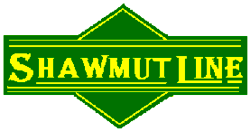Pittsburg, Shawmut and Northern Railroad

Pittsburg & Shawmut Railroad Steam Days
Take a trip back to the 1940’s and 1950’s when Pittsburg & Shawmut Railroad was in the steam era for a look onboard and lineside, amazing footage!
 The Pittsburg, Shawmut & Northern Railroad (reporting mark PSN) also known as the Shawmut Line, was a Class I railroad company operating passenger and freight service on standard gauge track in central Pennsylvania and western New York. The line was financially troubled for its entire life span and declared bankruptcy after just six years of operation. It would spend the remaining 42 year of its existence in receivership or trusteeship, one of the longest bankruptcy proceedings in American railroading history.
The Pittsburg, Shawmut & Northern Railroad (reporting mark PSN) also known as the Shawmut Line, was a Class I railroad company operating passenger and freight service on standard gauge track in central Pennsylvania and western New York. The line was financially troubled for its entire life span and declared bankruptcy after just six years of operation. It would spend the remaining 42 year of its existence in receivership or trusteeship, one of the longest bankruptcy proceedings in American railroading history.
The Pittsburg, Shawmut & Northern Railroad is often confused with the similarly named Pittsburg and Shawmut Railroad which was a spinoff company from the Pittsburg & Shawmut Railroad. Further adding to the confusion is the fact that both were nicknamed theShawmut Line, both operated in roughly the same geographic area, and both used nearly identical logos during their history. In fact the two were completely separate companies after their 1916 split.
The main line consisted of approximately 190 miles (306 km) of track extending from Brockway, Pennsylvania to Wayland, New York with several branches, particularly Olean, New York and Hornell, New York. Principal shops were divided between Angelica, New York (car shop, paint shop, maintenance of way) and St. Marys, Pennsylvania (motive power shop). Both shops burned during their existence and subsequently replaced.
The Pittsburg, Shawmut & Northern Railroad began life on August 2, 1899, as the merger of five small railroads in New York and Pennsylvania. 60 miles (97 km) of what ultimately became the Pittsburg & Shawmut were originally 36-inch (910 mm) narrow gauge lines, though by the time of the PS&N’s incorporation only 18 miles (29 km) remained as narrow gauge. At the time of its incorporation the PS&N operated four physically disconnected divisions. The expense of connecting the divisions and upgrading the physical plant to handle through coal trains coupled with the failure of the PS&N’s principal bond underwriter forced the company to declare bankruptcy in 1905. The company would continue to operate in receivership until 1946 when the bankruptcy was converted to a trusteeship.
The more lucrative Brockway to Freeport route was constructed beginning in 1903 as the Brookville & Mahoning. Confusion with the Boston & Maine caused the name to be changed to the Pittsburg & Shawmut Railroad. The P&S was leased (but never owned) by the PS&N from 1906 until 1916. After 1916, the lease was terminated and the two companies operated separately. During the time of the lease, the bigger “200 class” 2-8-2s of the P&S operated over the combined systems.
Coal (bituminous) was the principle commodity for the line during its entire existence, though passenger trains and, after the late 1920’s, self-propelled gas-powered passenger cars (known as the PS&N as “Hoodlebugs”) also ran on the route until they were discontinued in 1935.
PS&N operations ended effective April 1, 1947. Portions of the line serving Olean, Brandy Camp, and Farmers Valley were acquired by the Pennsylvania Railroad (the Farmers Valley portion is today owned by the Norfolk Southern Railway and operated by the Western New York & Pennsylvania Railroad). The Erie Railroad acquired the PS&N’s Hornell Terminals in a complex transaction from the American National Red Cross, which had been gifted ownership of the Rochester, Hornellsville & Lackawanna Railroad, an 11-mile long railroad leased to and operated by the PS&N and predecessors prior to 1946.
The spelling of Pittsburgh as Pittsburg in the company name derives from the company’s original 1899 charter. At the time, the official spelling of the name of Pittsburgh, Pennsylvania was without the “h”. The spelling of the city name was changed to Pittsburg in 1891 due to an effort by the United States government to standardize the spelling of place names in the United States. Bowing to civic protest, the spelling was changed back to Pittsburgh in 1911.
http://en.wikipedia.org/wiki/Pittsburg,_Shawmut_and_Northern_Railroad

